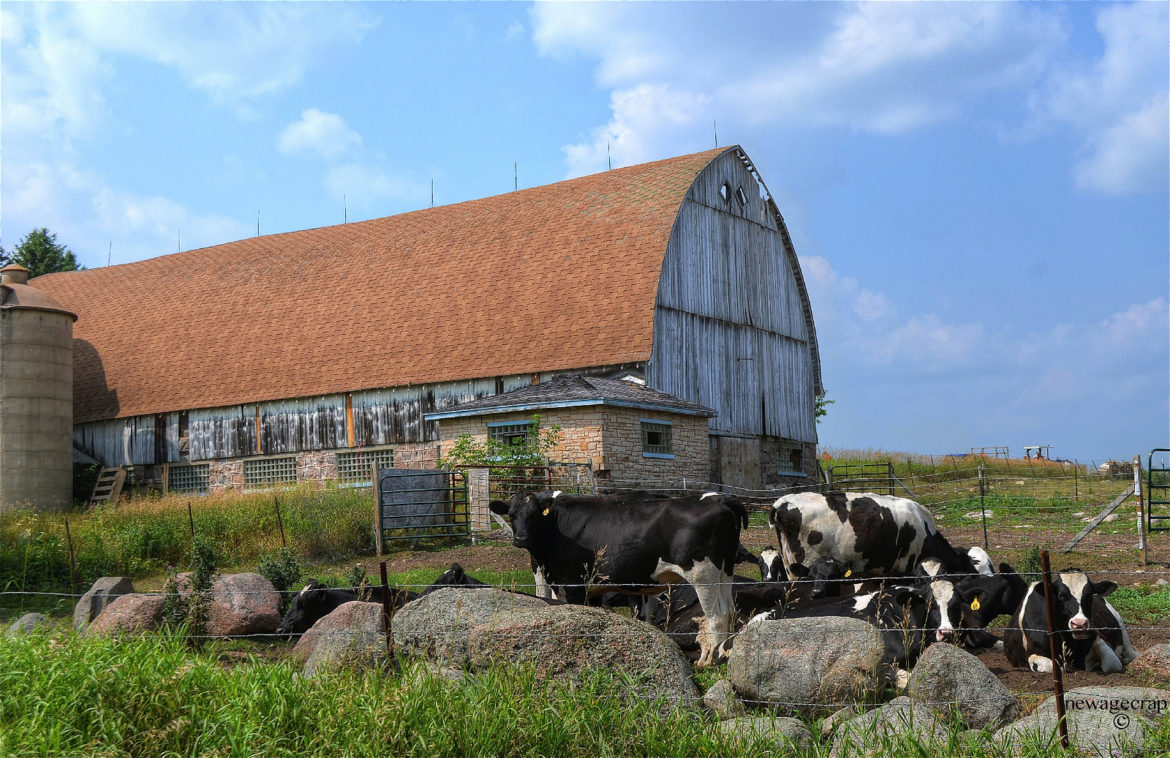Biogas Producers Face Barriers
State has 38 biodigesters, but many have problems getting gas to the market.

A dairy farm in Wisconsin. Photo by William Garrett / Creative Commons.
For dairy or other farmers in states like Wisconsin, manure is a never-ending headache, often literally. It can fertilize fields, but when laid on too thick when the ground is frozen or before heavy rains, it easily runs off into streams and lakes and can pollute groundwater. Nearby residents suffer with the odor and worry about contamination. And cows never stop making it.
Manure biodigesters — which process manure and deal with pathogens and odors while producing useful byproducts — can help. And through microbial reactions, the biodigesters produce biogas that can be burned to generate electricity, used to heat buildings or processed into vehicle fuel.
Focus on Energy has already helped fund 38 biodigesters in Wisconsin with more than $8 million in funding, according to the state Public Service Commission. Most of them generate electricity onsite by burning the biogas, and that electricity can be fed into the grid and sold to the local utility.
However, rates for this electricity are currently low, and higher rates that utilities had previously paid for energy from biodigesters — to help jumpstart the sector — are expiring.
That means it’s increasingly less financially viable to build a biodigester that produces electricity. A better option, as many see it, is to clean up the biogas produced by a biodigester and sell that. Renewable fuel standards at the federal level and in some states mean that such biogas can be sold at relatively high rates and help fuel suppliers meet renewable mandates.
Pipeline injection hurdle
But there is still a major challenge. Utilities that operate gas pipelines in Wisconsin — including We Energies and Alliant Energy — do not allow individual users to inject gas into their pipelines.
Gas can be injected into interstate pipelines to be moved outside Wisconsin, but the gas needs to get to these pipelines, either by being compressed and delivered in vehicles or through conduits that connect to the interstate pipelines. Public Service Commission spokesperson Elise Nelson said she is not aware of any pipeline injection in Wisconsin.
“You can go to interstate pipelines that are not controlled by utilities, but there’s not as much of a network of those, just one or two big ones,” said Shashi Menon, managing partner of the firm EcoEngineers, which consults on biodigester projects. “You could build your own filling station, clean up the gas and get it to a filling station where trucks come in and fill up with CNG (compressed natural gas). If you can do all that, then it’s possible. But it’s expensive and there would have to be enough customers to buy the gas, which may or may not be the case.
“In theory it’s all possible, but you need everybody to cooperate.”
The RFP amount would not cover widespread construction of biodigesters or related infrastructure, but it is seen as a support that could attract private investment. As shown in an online video, the state’s Public Service Commission has encouraged the development of a “hub and spoke” model where different farms would pump manure to a large, centralized farm digester.
“One model is you have more digesters out in the medium and large farms, doing the digestion there and compressing the gas and then moving the gas by trucks and trailers to a centralized spot where you would inject the biogas” into interstate pipelines, said Tyler Huebner, executive director of RENEW Wisconsin. “Or you could be moving more manure to one large central digester. Different folks will come up with different options.”
Utility viewpoint
Utilities have often been supportive of biodigesters, offering incentive programs and partnering with dairy farms on biodigester development.
Alliant Energy spokesperson Annemarie Newman explained that the utility had previously offered a higher price for electricity produced through biodigesters to stimulate the sector. That program lasted for 10 years and covers four digesters. Now that program is expiring and customers generating energy through biodigesters will be paid standard market rate for electricity.
The rate We Energies pays new digesters was reportedly scaled back last year from 9.2 to 4.24 cents per kilowatt-hour.
“As these contracts expire, we simply offer these customer-generators a new rate that reflects the current wholesale market value of the generation,” said spokesman Brian Manthey. “The wholesale market value for generation has been declining and therefore it is the case that what we are offering is less than what was paid under previous contracts with us.”
If customers with biodigesters were able to get their biogas into utilities’ pipelines, they could sell the gas to the utility in a model similar to how electricity is sold to the grid.
The Wisconsin Public Service Commission cannot require utilities to allow biogas to be injected into their pipelines, Nelson said. Newman said Alliant might consider the possibility.
“Natural gas that goes directly into utility pipelines must meet certain quality standards. Biogas must be scrubbed to remove moisture, ammonia and other impurities to make sure it is safe for customers and does not corrode pipelines,” Newman said. “Whether customers can inject biogas directly into pipelines is new territory for the utility industry. Biogas is a valuable resource, so we think it’s worth exploring and we are taking a look at it. It’s a matter of making sure the safety requirements are met.”
Manthey said We Energies does not allow customers to sell biogas to the utility. “We are concerned about the effect injection of the methane gas from biodigesters would have on the integrity of our customers’ distribution system,” he said.
Other ways to benefit
If farms or other entities with biodigesters use the biogas or electricity from biodigesters themselves, the system may be financially viable even without selling electricity or biogas to the utility or interstate producers.
“Farms that are able to use the electricity on-site, rather than selling it onto the grid, continue to benefit because they can avoid purchasing electricity from the utility at the much higher retail rates,” Nelson noted.
Huebner suggested that biogas from biodigesters could be sold to large nearby institutions like hospitals that could use it for heating or for combined heat and power operations, where the gas is used to generate electricity and then the waste heat is captured and used, making the whole operation more efficient.
In this case the biogas would still need to be transported from the biodigester to the institution using it, or theoretically the manure could be pumped to a biodigester on the site where biogas would be used.
Huebner said the multiple environmental and financial benefits of biodigesters are such that he hopes farmers, institutions, elected officials and other players get creative in figuring out how to integrate more of them into the state’s energy landscape.
“The RFP is geared towards parts of the state where manure is causing water quality issues,” he said. “It’s about the production of biogas, but it’s also getting the raw manure off the fields and processing it so it’s not seeping into groundwater. Once you process it there are usable pieces — nitrogen and phosphorus — that can be applied to land and are much more bio-available for crops to take up as opposed to putting manure on fields. And you’re taking care of the pathogen problem in a big way. It’s a big undertaking, but the benefits are many.”
This story was originally published by Midwest Energy News.















According to the Environmental Protection Agency (EPA) biogas produced through manure operations is the cleanest transportation fuel in the world perfectly suited to serve the heavy duty vehicle market.
The cost to build a hub and spoke model to serve this market is extremely high compared to other biogas projects (landfills and wastewater treatment facilities).
Hopefully this grant program will provide the necessary jump start to move these projects from paper to production.